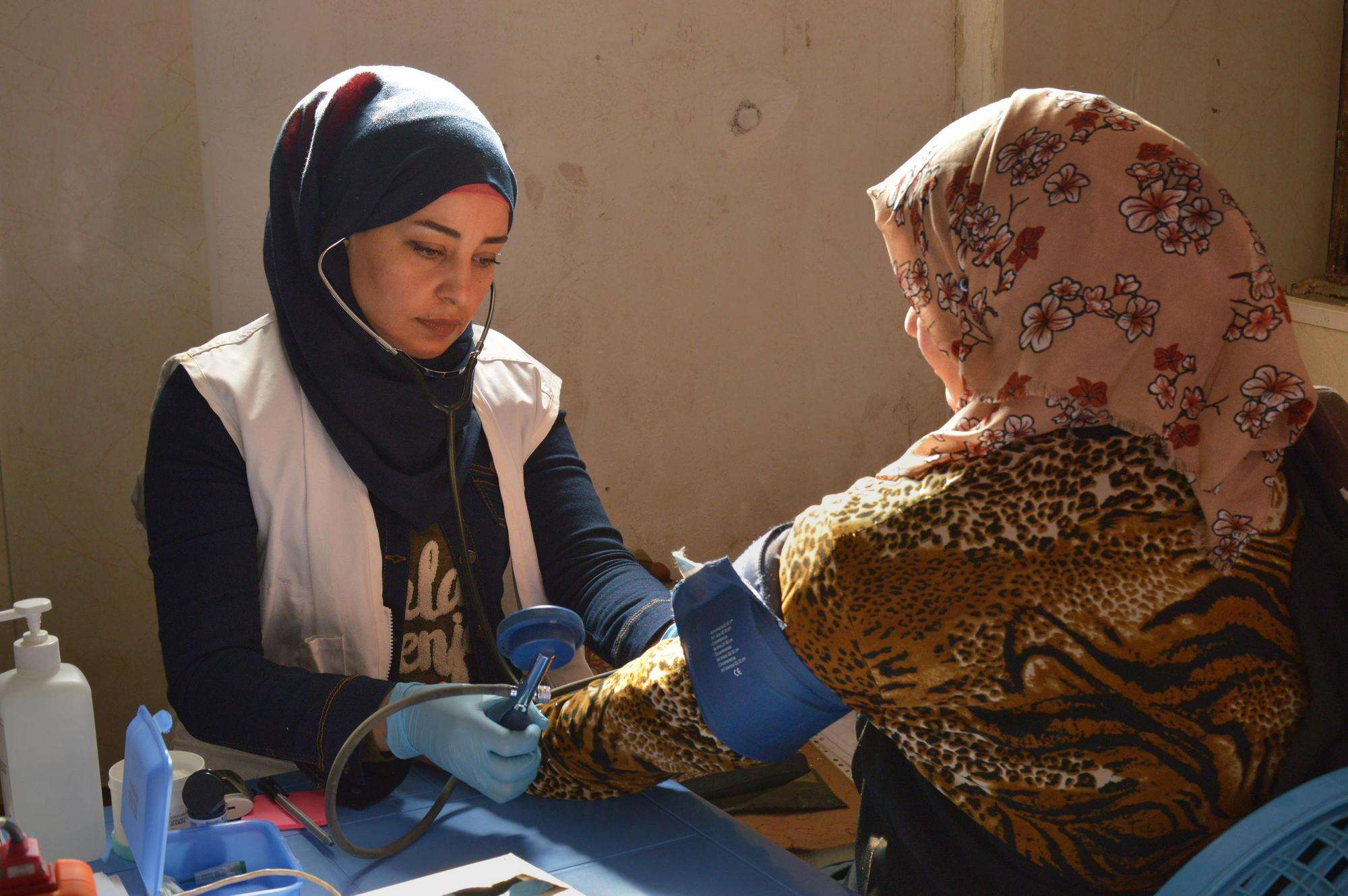Thirty-five-year-old Ahmed sits in the crowded waiting room at the primary health care center in Hawija, in Iraq’s Kirkuk Province. Zainab, his 16-year-old sister, sits close beside him, nervously drumming on her knees with her fingers. They’ve come to the clinic—where Doctors Without Borders/Médecins Sans Frontières (MSF) provides medical consultations and treatment for people living with chronic health conditions—to hear a doctor’s opinion on their mother’s hypertension.
The family lives in a village in the Al Riyadh area, not far from Hawija. For almost four years the district was under the control of the Islamic State (IS) group. After a long siege, a military offensive finally drove out IS in October 2017, but not before leaving much of the region in ruins. Now that the military offensive is over, many of those who fled are slowly beginning to return to rebuild their homes and lives. But episodes of violence persist in this rural region, and insecurity lingers along the highway, which is dotted with military checkpoints.
“My only hope is to get back to normal”
“The situation is better now, but we have a curfew at night and it is tough,” says Ahmed. “Two days ago, my mother had high blood pressure and I wanted to take her to the hospital, but I couldn’t because of the curfew. I brought her here today because I was told that MSF was here in Hawija and could help her.”
“When the IS group controlled the district, it was hard to find medicines,” he says. “One box of paracetamol could cost up to 25,000 Iraqi Dinars (around $21—the price has now dropped back to 500 Dinars, or around $0.40). Life was hard, but fleeing was even harder. The mountains were littered with landmines and explosives. Some of my uncles and their families lost their lives trying to escape through the mountains. I stayed behind with my mother, because of her health condition and to protect my home. The rest of my family managed to leave safely through the mountains. We could have been executed for that. Now, my only hope is to get back to normal.”
Hawija’s health facilities have not been spared the effects of the conflict. According to the Iraqi Ministry of Health, 35 percent of primary health care centers in Kirkuk are non-functional, leaving many people’s medical needs unmet.
Chronic conditions left untreated
In response to the lack of medical services in Hawija, MSF began to work in the area in December 2017. Initially our teams worked in Abassi sub-district, providing treatment for noncommunicable diseases and clean drinking water for residents returning to the area in collaboration with the Iraqi Directorate of Health and Water. In April 2018, MSF began supporting Hawija Primary Health Care Center and Hawija Public Hospital.
“There is a dire need for treatment for chronic diseases, as drugs are scarce in the hospitals and people can’t afford to buy them,” says Gheda Jasim, an MSF nurse working in Hawija. “We receive patients living with chronic diseases such as high blood pressure, diabetes, asthma, epilepsy and heart disease—our services are essential for them.”
Five-year-old Mahmoud, for example, is from Al Shajara village, around 11 miles from Hawija. Diagnosed with diabetes when he was two, for the past few years Mahmoud has been unable to regularly take the treatment he needs due to the lack of functional health facilities and the district’s insecurity. Now he visits MSF’s clinic in Abassi once a month for medical consultation and treatment.
Jasim, a native of Hawija, feels proud be able to help people who have been through so much hardship. “When the IS group took over we decided to move to Kirkuk,” says Jasim. “Now I’m proud to return every day here, where I belong, as part of the MSF medical team. I feel that I’m supporting my people with much-needed services. I hope that at least this can ease the burden of all that they have been through.”
In Abassi and Hawija, MSF teams provide medical consultations and treatment for noncommunicable diseases, mental health support, health education sessions, and advice on healthy living. In 2018, more than 1,580 patients living with chronic diseases received consultations and treatment in Hawija Primary Health Care Center, and more than 1,820 people attended health education sessions on chronic diseases, sexual and reproductive health, psychological first aid, and endemic diseases. In the same period, more than 1,330 patients living with chronic diseases received consultations and treatment at Abassi Primary Health Care Center, more than 6,000 people attended health education sessions, and 253 patients received psychological support.
MSF first worked in Iraq in 1974 and has been working continuously in the country since 1991. Today we provide primary and secondary health care, pre- and postnatal health care, treatment for chronic diseases, surgery and rehabilitation for trauma patients, mental health support, and health education in Baghdad, Diyala, Erbil, Ninewa, and Kirkuk provinces.
Patient names have been changed to protect anonymity.




